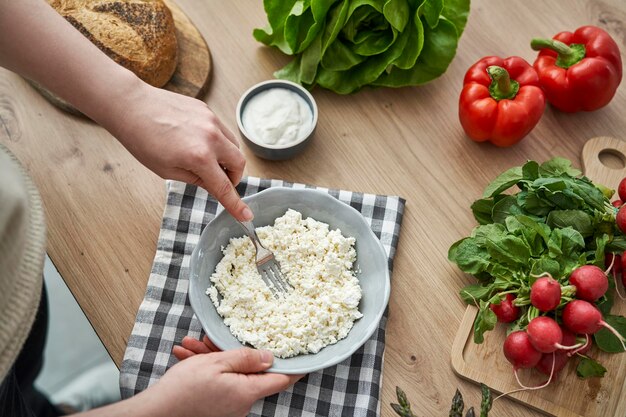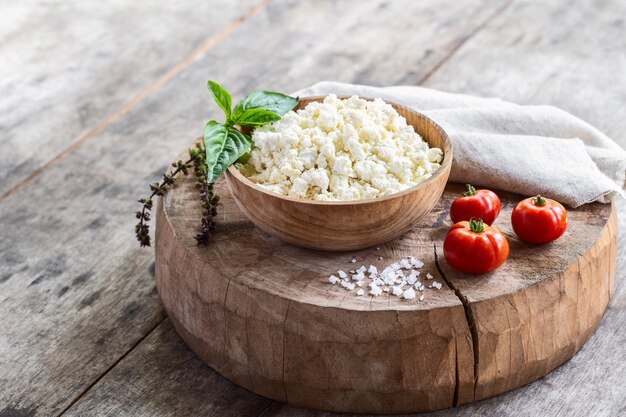Cottage cheese has gained a reputation as a go-to food for health enthusiasts. But is it good for weight loss? Packed with protein, low in calories, and versatile in recipes, it’s a favorite among those aiming to shed pounds.
This creamy, nutrient-rich dairy product helps keep you full. It also supports muscle maintenance, making it an excellent addition to a balanced diet. Whether you enjoy it as a snack or in desserts, this cheese can fit seamlessly into your weight loss journey. Let’s dive deeper into how this simple food can help you achieve your fitness goals.
What is Cottage Cheese?
It is a fresh cheese made from curds of cow’s milk. Unlike aged cheeses, it doesn’t undergo a long maturation process, giving it a mild, creamy flavor. Its soft texture, combined with its slightly tangy taste, makes it a favorite in many recipes.
How is Cottage Cheese Made?
The process begins with curdling milk using an acid, such as vinegar or lemon juice. Once the curds form, they are separated from the whey, drained, and rinsed. Depending on the desired consistency, cream or milk is added to the curds. This results in the creamy product we know as cottage cheese.
Types
It comes in various forms to suit different preferences:
- Regular: Higher in fat and creamier in texture.
- Low-Fat: Contains less fat while retaining a creamy consistency.
- Non-Fat: Fat-free but slightly less rich in flavor.
Each type caters to specific dietary needs, ensuring that cheese can fit into almost any diet plan.
Cottage Cheese Nutrition and Health Benefits
It is packed with nutrients that offer a variety of health benefits. Let’s break down its key components and why they matter.
1. Protein:
One of the standout features of cottage cheese is its protein content. It’s an excellent source of high-quality protein. This protein is essential for building and repairing muscles, supporting immune function, and keeping you feeling full.
For athletes and fitness enthusiasts, the protein in it makes it a fantastic post-workout snack. A single cup can provide over 25 grams of protein, depending on the type.
2. Calcium
Calcium is crucial for maintaining strong bones and teeth and supporting nerve and muscle function. It is not rich in calcium as hard cheeses. However, it still provides a significant amount, particularly in the full-fat versions.
Health Benefits
It contributes to overall health in many ways. Here are its key benefits:
- Weight Management: High protein and low-calorie content make it ideal for weight loss.
- Digestive Health: It’s low in lactose compared to other dairy products, making it easier to digest for some people.
- Heart Health: Low-fat and non-fat versions can help reduce saturated fat intake, which is good for heart health.
Is Low-Fat Cottage Cheese Good for You?
Low-fat cottage cheese strikes a balance between taste and health. It has fewer calories and less fat than regular varieties. This nutrient content makes it an excellent choice for those watching their fat intake. At the same time, it retains a good amount of protein and nutrients to ensure adequate nutrition provision.
How to Include Cottage Cheese in Your Diet?

Adding this cheese to your meals is easy, thanks to its versatility. Here are some creative ways to enjoy it:
1. As a Breakfast Boost
Start your day with a protein-packed breakfast. Add a dollop of this cheese to your scrambled eggs, or spread it on whole-grain toast with avocado. Pair it with fruits like berries, bananas, or melons for a sweet and satisfying start to your day.
2. In Smoothies
Blend cheese into your smoothies for a creamy texture and an extra dose of protein. Combine it with spinach, bananas, and almond milk for a nutrient-rich green smoothie.
3. As a Snack
Cottage cheese makes a quick and healthy snack. Sprinkle it with nuts, seeds, or a drizzle of honey for a tasty treat. For a savory twist, try it with chopped cucumbers, tomatoes, and a pinch of salt and pepper.
4. In Salads
Transform your salads by adding cottage cheese as a topping. It pairs well with leafy greens, roasted vegetables, and grains like quinoa or farro.
5. In Main Dishes
Use cottage cheese as a substitute for ricotta in lasagna or stuffed pasta. It also works as a base for creamy dips or spreads.
Who Can Benefit Most from this Cheese?
It is a fantastic choice for various dietary needs. Here’s who benefits most:
Athletes and Fitness Enthusiasts
This cheese is high in casein, a slow-digesting protein. This makes it perfect for muscle repair and recovery, especially when consumed before bedtime. Its low-fat varieties also help athletes meet their nutritional goals without excess calories.
Weight Watchers
The combination of high protein and low calories makes cottage cheese ideal for weight management. It keeps you full for longer, reducing the temptation to snack on unhealthy options.
Older Adults
As people age, their bodies require more calcium and protein to maintain bone density and muscle mass. Cottage cheese offers both in an easily digestible form.
Pregnant Women
Cottage cheese is rich in protein and calcium. It contains essential nutrients for both mother and baby during pregnancy. Just ensure it’s made from pasteurized milk to avoid potential health risks.
Common Concerns
While cottage cheese is nutritious, there are some concerns to consider:
1. Sodium Content
Cottage cheese can be high in sodium. It is not suitable for individuals on low-sodium diets. Look for low-sodium varieties to reduce this risk.
2. Lactose Intolerance
Although it’s lower in lactose than many dairy products, it may still cause issues for those with lactose intolerance. Lactose-free versions are a great alternative.
3. Additives in Flavored Varieties
Pre-flavored cottage cheese often contains added sugars or artificial ingredients. Opt for plain versions and add your own natural flavors like fruit or spices.
Tips for Choosing It
Not all cottage cheeses are created equal. Here are some tips for picking the best one:
- Check the Label: Look for products with minimal ingredients—just milk, cream, and salt.
- Opt for Low-Sodium Versions: If you’re watching your salt intake, choose a low-sodium option.
- Consider Fat Content: Decide based on your dietary needs—regular for creaminess, low-fat or non-fat for fewer calories.
- Go Organic: Organic varieties often come from cows raised without hormones or antibiotics.
Is Cottage Cheese Good for You?

It is a versatile dairy product that has earned a spot in many health-conscious diets. Its creamy texture, mild flavor, and impressive nutritional profile make it a favorite among fitness enthusiasts. But is cottage cheese good for you? Let’s explore its benefits, uses, and role in maintaining a healthy lifestyle.
Weight Loss
Is cottage cheese good for you to lose weight? Yes! it is high in protein and low in calories, making it ideal for weight loss. The protein keeps you full longer, reducing hunger and snacking. Choose low-fat or non-fat versions for fewer calories without sacrificing nutrition.
Heart Health
Low-fat cottage cheese is better for heart health since it contains less saturated fat. Saturated fats can raise cholesterol levels. So, opting for lower-fat options can reduce the risk of heart disease. Look for low-sodium varieties to protect your cardiovascular system.
Digestive Health
This cheese is easier to digest than many other dairy products, especially for people with mild lactose intolerance. It also contains probiotics in some brands, which promote gut health. However, high-sodium versions might not be suitable for sensitive stomachs.
Liver Health
Cottage cheese is rich in casein protein, which helps protect the liver. It also contains essential nutrients that support liver function. It also reduces the risk of fatty liver disease. Pair it with a balanced diet for maximum benefit.
Diabetes Management
Cottage cheese has a low glycemic index, meaning it won’t spike blood sugar levels. The high protein content helps regulate blood sugar. It makes it an excellent choice for diabetes management. Choose unsweetened and low-fat options for optimal results.
Full-Fat vs. Low-Fat Options
Full-fat cottage cheese contains more calories and saturated fat, which can contribute to weight gain if consumed in excess. Low-fat and non-fat versions are better for those aiming to control their calorie intake. Both options are rich in protein, so the choice depends on your dietary needs.
When and How Much Cottage Cheese Should You Eat?
Moderation is key when it comes to including cottage cheese in your diet.
How much cottage cheese should I eat a day?
One to two servings a day (about half a cup per serving) is ideal. This amount provides essential nutrients without overloading calories or sodium.
Is cottage cheese good for you before bed?
Cottage cheese is rich in casein protein, which digests slowly. Eating it before bed supports muscle repair and keeps you full through the night. It’s also a great snack between meals or as part of breakfast.
Is Cottage Cheese Dairy?
Yes, it is a dairy product made from cow’s milk. Its classification raises some questions for people with lactose intolerance. It contains less lactose than other dairy products. People with mild lactose intolerance may tolerate small amounts. Lactose-free options are available for those who are highly sensitive.
FAQs
1. Is cottage cheese fattening?
No, not if consumed in moderation. Low-fat and non-fat varieties are lower in calories and fat, making them suitable for most diets.
2. How much cottage cheese should I eat a day?
Stick to 1–2 servings a day. This ensures you get its nutritional benefits without exceeding your daily calorie or sodium limits.
3. Is cottage cheese good for you before bed?
Yes, it’s a great nighttime snack. Its slow-digesting protein keeps you satisfied and aids in muscle recovery during sleep.
Conclusion
Cottage cheese is a nutritional powerhouse. It’s high in protein, packed with calcium, and adaptable to various diets and health goals. Whether you’re aiming to lose weight, support your heart, or manage diabetes, cottage cheese can play a vital role. Pair it with fruits, vegetables, or whole grains for a balanced meal. With so many benefits, it’s clear that cottage cheese deserves a spot in your diet.

